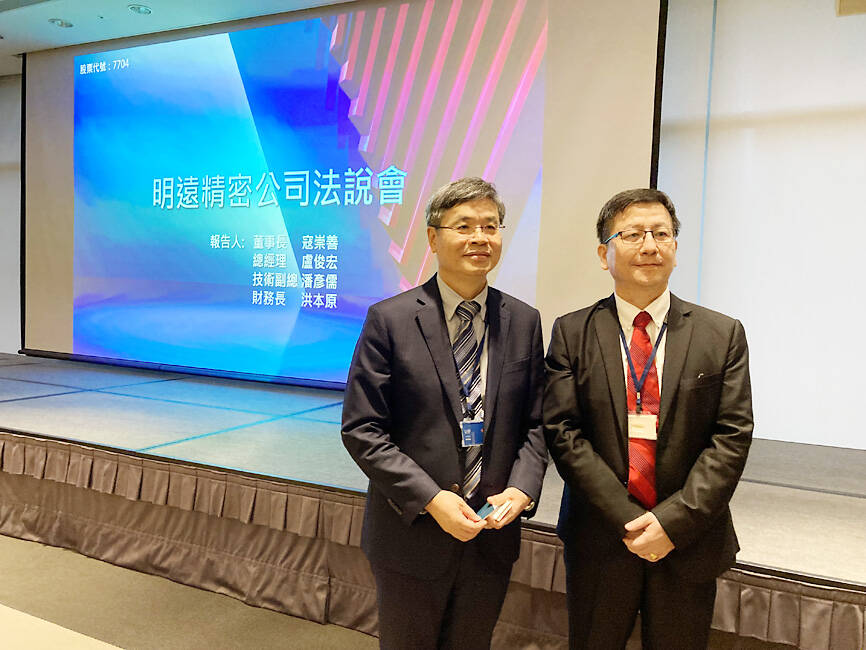Shares of Finesse Technology Co (明遠精密), which provides semiconductor equipment and maintenance services, soared on their debut on the Emerging Stock Board yesterday, as the company is expected to benefit from the global expansion of its major customers, such as Taiwan Semiconductor Manufacturing Co (TSMC, 台積電).
The stock traded at an average price of NT$87.98 yesterday, compared with its initial public-offering price of NT$60 per share. The company said it would use the proceeds to fund its expansion overseas.
Finesse on Thursday said it is studying the feasibility of building a factory in the US to keep pace with its key customers’ investments there to bolster the US’ semiconductor supply chain.

Photo: Lisa Wang, Taipei Times
In Japan, Finesse is collaborating with its parent company, Highlight Technology Corp (日揚), to build a factory in Kumatodo Prefecture as its major customers are building multiple fabs in the area.
The factory is to start operation in the middle of next year, Finesse said on Thursday.
Finesse counts TSMC and world-leading chip equipment suppliers as some of its key customers in Japan. TSMC plans to build two fabs in Kikuyu, Kumamoto Prefecture. It aims to crank out less advanced chips by the end of next year from its first Japanese fab.
“Our major customer is building factories there [Kumatodo]. We plan to provide localized services to our customers’ plants,” Finesse president Gilbert Lu (盧俊宏) told an investors’ conference in Taipei. “In addition, the company has been building strong partnerships with Japanese companies.”
Finesse is following key customers’ footsteps in expanding its global footprint, which was unthinkable in the past, given its smaller scale, Lu said.
As the company’s key customer is expanding capacity in the US, Finesse is evaluating the feasibility of building a new factory there, company chairman C.S. Kou (寇崇善) told investors.
“We are discussing details with Highlight Technology. When it comes to building a factory in the US, the company has to put more factors into consideration than when building one in Japan,” Kou said. “Our customers, all world-class companies, are building fabs in the US.”
High manufacturing cost is one of the deciding factors, Finesse said.
Building a factory together with Highlight Technology, which owns about 35.51 percent of Finesse, will reduce running costs, it said.
Finesse supplies key semiconductor equipment such as its own-brand RF generator power system, dubbed ACME, and advanced ozone supply system used in wafer cleaning. Equipment made up about 47 percent of the company’s revenue in the first half of this year.
More than half of its revenue, 53 percent, came from providing higher-margin equipment maintenance services for foundry companies and semiconductor equipment suppliers. Maintenance service revenue contracted in the first two quarters, as the business is highly linked to the ups-and-downs of customers’ equipment utilization, it said.
Finesse is looking to grow its revenue next year, pinning its hopes on a recovery of the world’s semiconductor industry as most research agencies forecast, Kou said.
Based on Finesse’s observations, customers’ capacity utilization rates are still relatively low, he said.
Finesse’s revenue expanded about 6 percent year-on-year to NT$375 million (US$11.91 million) during the first half of the year, aided by shipments of its own-brand semiconductor equipment. Gross margin dropped to 39 percent from 42 percent due to smaller revenue contribution from its equipment maintenance services.
Net income plunged about 23.54 percent to NT$54.43 million during the first six months from NT$71.19 million a year ago. Earnings per share fell to NT$1.98 from NT$2.98.

Intel Corp chief executive officer Lip-Bu Tan (陳立武) is expected to meet with Taiwanese suppliers next month in conjunction with the opening of the Computex Taipei trade show, supply chain sources said on Monday. The visit, the first for Tan to Taiwan since assuming his new post last month, would be aimed at enhancing Intel’s ties with suppliers in Taiwan as he attempts to help turn around the struggling US chipmaker, the sources said. Tan is to hold a banquet to celebrate Intel’s 40-year presence in Taiwan before Computex opens on May 20 and invite dozens of Taiwanese suppliers to exchange views

Application-specific integrated circuit designer Faraday Technology Corp (智原) yesterday said that although revenue this quarter would decline 30 percent from last quarter, it retained its full-year forecast of revenue growth of 100 percent. The company attributed the quarterly drop to a slowdown in customers’ production of chips using Faraday’s advanced packaging technology. The company is still confident about its revenue growth this year, given its strong “design-win” — or the projects it won to help customers design their chips, Faraday president Steve Wang (王國雍) told an online earnings conference. “The design-win this year is better than we expected. We believe we will win

Chizuko Kimura has become the first female sushi chef in the world to win a Michelin star, fulfilling a promise she made to her dying husband to continue his legacy. The 54-year-old Japanese chef regained the Michelin star her late husband, Shunei Kimura, won three years ago for their Sushi Shunei restaurant in Paris. For Shunei Kimura, the star was a dream come true. However, the joy was short-lived. He died from cancer just three months later in June 2022. He was 65. The following year, the restaurant in the heart of Montmartre lost its star rating. Chizuko Kimura insisted that the new star is still down

While China’s leaders use their economic and political might to fight US President Donald Trump’s trade war “to the end,” its army of social media soldiers are embarking on a more humorous campaign online. Trump’s tariff blitz has seen Washington and Beijing impose eye-watering duties on imports from the other, fanning a standoff between the economic superpowers that has sparked global recession fears and sent markets into a tailspin. Trump says his policy is a response to years of being “ripped off” by other countries and aims to bring manufacturing to the US, forcing companies to employ US workers. However, China’s online warriors